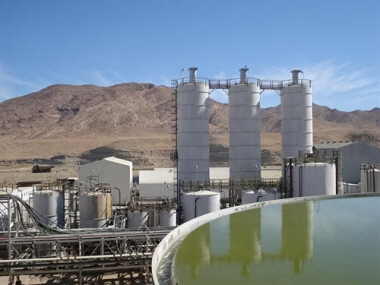Full financial support has been finalised for an extension at a Namibian uranium mine, while Australian and US projects have reached more regulatory milestones, and a production increase is planned in Kazakhstan.
 |
| Langer Heinrich (Image: Paladin) |
Paladin's own cash reserves have been used to fund the initial development for the expansion project, which is now fully financed and on track to reach nameplate capacity in the first quarter of 2012. The expansion will increase the mine's annual output from 3.7 million pounds U3O8 (1425 tU) to 5.2 million pounds U3O8 (2000 tU).
Paladin recently signed three sales agreements with US customers for more than 2.8 million pounds U3O8 (1077 tU) of the output from the stage 3 expansion, for delivery between 2012 and 2016.
US ISR projects getting closer
Uranium projects in the USA have been making progress through regional regulatory systems. Ur-Energy has received aquifer exemption for the Lost Creek in-situ recovery uranium project from the federal Environmental Protection Agency, in agreement with the Wyoming Department of Environmental Quality. The only outstanding action required from state regulators is now the final approval and issuance of the permit to mine.
Inkai increase agreement inked
|
Meanwhile, Uranium Energy Corp (UEC) has received a draft radioactive material licence for the Goliad in-situ recovery project from the Texas Commission on Environmental Quality. Uranium Energy is now reviewing the draft licence before passing on its comments to the Commission for a final review and 30-day public notice period before the final radioactive materials licence can be issued.
UEC has also moved to reinforce its activities in Texas by buying a strategic database on uranium targets in the Goliad formation from Uranium One in a deal worth $900,000. The database includes raw and interpreted data, with uranium logs from 2.8 million feet (850,000 metres) of historic drilling as well as unevaluated data on over 40 uranium targets in the region. UEC president and CEO Amir Adnani said that the database and associated acquisition and exploration targets would be incorporated into the ongoing efforts to develop additional uranium sources for processing at its Hobson plant.
Regulatory OK for Ranger development
The government of Australia's Northern Territory has approved the construction of the A$120 million ($127 million) Ranger 3 Deeps exploration decline, subject to obtaining all necessary regulatory approvals. The decline will allow Energy Resources of Australia Ltd (ERA) to conduct close space underground exploration drilling and the exploration of areas adjacent to the Ranger 3 Deeps resource. Construction of the decline is scheduled to begin in May 2012.
Researched and written
by World Nuclear News





_28178.jpg)
_66891.jpg)
_16128_62584.jpg)





